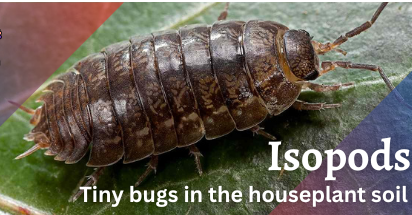what are tiny Grey bugs in houseplant soil with ancient looks wandering there? Don’t worry, they are Isopods (Armadillidium vulgare). You can easily get rid of them by a bite drying out the soil. Are they harmful to your potted plant? Can they bite you? Keep reading to answer these questions and more about getting rid of pill bugs in house plants.
One of the most common tiny bugs in the soil of your houseplants is Isopods (Armadillidium vulgare). They also are known as Pill bugs, Woodlouse or Roly-polys. If you are involved with them, join us in this article to tell you about:
- Are isopods good for potted plants and terrariums?
- Can isopods eat houseplant leaves or bite you?
- Why do I have tiny pill bugs in my houseplant?
- How to get rid of pill bugs?
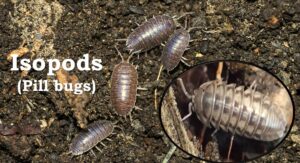
In addition, you may find other tiny bugs in your houseplant soil too, such as:
If the above tiny bugs are also your annoying guests, click on them to know more details and how to get rid of them.
However, if you even have failed to identify the exact culprits, please first read “The 6 common tiny bugs in houseplant soil” to show you how to identify the culprits by their images!”.
Before diving into our subject, you should know that I will walk with you so, feel free to ask your question below this page. Now, let’s get going.
What do the Isopods (Pill bugs) look like?
Here is not an entomology class, hence I thought the following image is enough to detect Pill bugs. For getting rid of pill bugs in the house you should first detect them correctly. As you see in the below picture, they have an ancient look, don’t have?
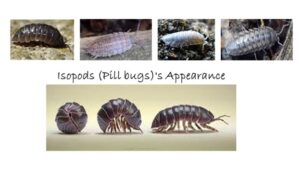
Pill bugs are (see the above picture):
- Wingless
- With an oval or slightly elongated body
- About 3 cm (1/2 inch) long
They also have 7 pairs of legs. Also, you may find them rolling into a ball like in the following picture.
What are the habits of Isopods?
If you want to get rid of pill bugs in the house or control their population in your houseplant, first, you have to know about their habitat and favourite environment. In the following, you can find tips about their habits:
- Isopods need moisture to survive
- They love damp and dark places like rocks, rotting logs, dead leaves, etc.
- They hate the heat but love the damp soil
- They are active at night and often sleep all day under the soil to stay out of the sunlight.
Are isopods good for potted plants and terrariums?
Yes! They are close friends of indoor and outdoor gardeners. Hence, be kind to them. Pill bugs are beneficial to your houseplant for the following reasons:
- They help the soil aerate by burrowing it. It is important to improve the root system of your houseplant and increase the receiving oxygen to roots.
- They are detritivores and feed on dead plants and other organic matter. As a result, they break down organic materials and convert them to usable nutrients for your houseplant. thanks to Isopods!
- “Frass” or “bug poop” is the waste from isopods that plays as fertilizer for your indoor plant.
- You can keep them as funny animals in your terrarium or vivarium.
Can isopods eat houseplant leaves or bite us?
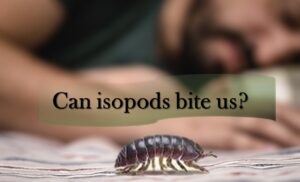
As mentioned earlier, pill bugs feed on dead organic materials and they often are of no interest to fresh parts of your houseplant such as its younger leaves or roots. However, if they are away from their favourite habitat, they may feed on fresh plants too. However, pill bugs are not too harmful. In addition, their benefits for your houseplant are much more than their damages.
They do not bite or sting you. So, Isopods are of no interest to your clothes and food too. don’t worry about them. But if they irk you enough that you want to get rid of them, keep reading to tell you several practical treatments.
How to get rid of isopods in the soil of the houseplant?
As mentioned earlier these tiny grey bugs in houseplant soil not only are harmless for your indoor plant or you, but they also are beneficial for your houseplant. However, if you spot a large infestation of them and want to control their population or you cannot tolerate their presence in your house, there are suggested remedies in the following.
Most of the following treatments are based on changing the interested habitat of Isopods. If you jump from that part, please read it again.
1- Avoid overwatering to get rid of pill bugs in the house.
Pill bugs seek damp soils, hence, if you allow your houseplant to experience a dry soil condition for a short time, pill bugs will leave it. It can be an efficient treatment if:
- Your potted plant can tolerate dry conditions.
- There are only a few isopods in your houseplant.
2- Change the soil of your houseplant.
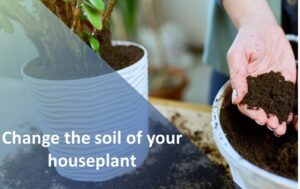
You can re-pot your indoor plant and dispose of its soil in a plastic bag. If your plant can tolerate the dry condition, it will be OK to expose your houseplant to air and sunlight for some time. In this situation, the other pill bugs don’t choose the new pot for their hangout.
➡ Be cautious! your houseplant may be hit by this treatment. So, before performing it, read about both the favourite and risky environmental conditions of your houseplant.
3- Get help from Diatomaceous Earth to get rid of pill bugs in the house.
Spread Diatomaceous Earth on the top of the soil of your houseplant. It is fossilized remains of microscopic organisms with sharp edges that cause hard conditions for pill bugs.
- Buy a “Food Grade” type, and avoid buying the pool filter types
- During the spreading of Diatomaceous Earth on soil, you should wear an appropriate mask because it can cause breathing disorders. After it settles on the soil, it will be safe.
4- The Potato Trapping Pill Bug Method to get rid of pill bugs in the house.
Do you have an old potato in your kitchen? Let’s get going to create a natural trap for these tiny grey bugs in houseplant soil. If you don’t have it, you can use other organic materials such as a cantaloupe rind, although a potato trap is more functional.
- Cut an old potato in half.
- Remove a small part from the centre of each of the halves.
- Place the cut side of every half into the soil of your houseplant.
- Leave slices for a day or more to isopods come and eat them.
- In the morning you should empty your trap. Do you know why? As mentioned earlier, pill bugs work at night.
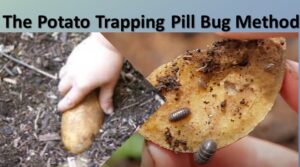
5- Put a Japanese Tree (Cryptomeria Japonica) near your houseplant.
Some plants such as Japanese trees are deterrents or even toxic to isopods. If you plant them near your indoor plants, they can deal with pill bugs as a natural treatment.
As mentioned earlier, Pill bugs love dark and damp places like under rocks, hence, if you remove their shelters, they will leave your houseplant’s pot. Some of the common hidden places of pill bugs are:
- Accumulated plant debris.
- The compact branches on the soil, try to prune them.
- Rocks and other decorative things that you put on your houseplant’s soil
Conclusion
Now, you are familiar with pill bugs. You know they are the gardeners’ friends and help you have more lush houseplants. In addition, you learned about Isopodes’ habits and found out if these tiny grey bugs in houseplant soil irk you enough, and how to get rid of them.
You understood the isopods are not the only tiny bugs in your houseplant’s soil other bugs such as Root aphids, Springtails, Mealybugs (Scales), Fungus gnats and Earwigs can attack your houseplant too.
Have you had any experience with Isopod? Are you going to make a friendship relationship with them or try to get rid of them? Do you think our remedy can work well? are there other treatments that not mentioned above? Please share your ideas and experiences with us below this page.

Elahe Rabiei
Hi, I’m Elaheh. My Academic major is plant protection, and houseplants are my expertise. As a houseplant lover, my house is full of indoor plants and it is my passion to take care of them. Hence, I’m here to share my knowledge and experience about growing healthy houseplants. I am also a plant protection advisor, so feel free to ask me any questions you may have.

